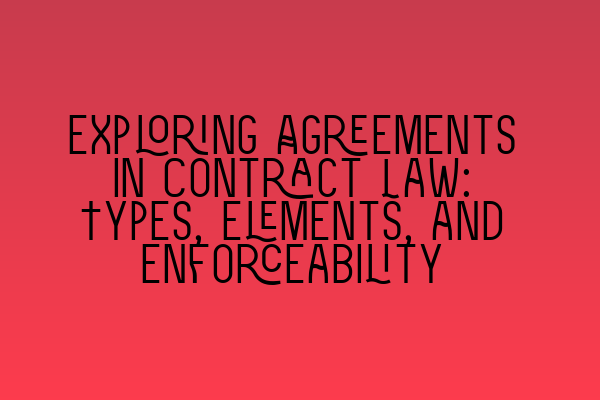Exploring Agreements in Contract Law: Types, Elements, and Enforceability
Welcome to the world of contract law! Contracts play a vital role in our day-to-day life, ensuring that parties involved in a transaction are bound by their promises. In this article, we will delve into the intricacies of agreements in contract law, exploring the various types, elements, and enforceability factors.
Types of Agreements
Contracts come in various shapes and sizes, each serving a specific purpose. Let’s take a closer look at some of the most common types of agreements:
1. Express Contracts:
An express contract is a written or spoken agreement in which the terms are explicitly stated by the parties involved. Express contracts are easily enforceable as they leave no room for ambiguity or misunderstanding. To gain a better understanding of express contracts, you can refer to SQE 1 Practice Mocks FLK1 FLK2.
2. Implied Contracts:
Unlike express contracts, implied contracts are not explicitly stated by the parties. Instead, they are inferred from the conduct or behavior of the parties involved. Implied contracts are based on the principle of “reasonable expectations” and often arise in situations where there is a clear understanding between the parties. Explore more about implied contracts through SQE 2 Preparation Courses.
3. Unilateral Contracts:
A unilateral contract is an agreement in which one party promises to do something in exchange for the other party’s performance. The contract becomes binding only when the requested act is performed. Unilateral contracts are commonly encountered in reward scenarios or situations where a promise is made in exchange for an action. To test your understanding of unilateral contracts, you can take a look at SQE 1 Practice Exam Questions.
Elements of an Agreement
To be legally enforceable, an agreement must contain certain key elements. Let’s examine these elements in detail:
1. Offer:
An offer is a proposal made by one party to another, expressing a willingness to enter into a contract. It must be clear, definite, and communicated to the offeree. To learn more about the intricacies of making an offer, consider exploring SQE 1 Preparation Courses.
2. Acceptance:
Acceptance is the offeree’s unqualified assent to the terms of the offer. It must be communicated to the offeror and match the terms of the original offer. Parties must be wary of communication barriers or non-conforming acceptance that may jeopardize the enforceability of the agreement.
3. Consideration:
Consideration refers to the exchange of something valuable between the parties involved in the agreement. It can be monetary or non-monetary, as long as it holds legal value. Remember that contracts without consideration are generally unenforceable.
4. Intention to Create Legal Relations:
In order for an agreement to be legally enforceable, the parties must demonstrate an intention to enter into a legally binding contract. This element focuses on distinguishing social agreements from legal agreements and is crucial in determining the enforceability of the contract.
Enforceability of Agreements
Not all agreements are enforceable in a court of law. Various factors come into play when determining the enforceability of an agreement. Let’s explore some of the key considerations:
1. Capacity:
The parties entering into an agreement must have the legal capacity to do so. This means they must be of sound mind, of legal age, and not under any undue influence or duress. If any party lacks capacity, the agreement may be deemed void or voidable.
2. Legality:
An agreement can only be enforceable if its purpose and terms are legal. Contracts that involve illegal activities or violate public policy are generally unenforceable. It’s important to ensure that your agreements comply with the law to avoid complications down the line.
3. Consent:
For an agreement to be valid, all parties involved must give their free and genuine consent. Consent can be affected by various factors such as mistake, misrepresentation, undue influence, or duress. If any of these factors are present, the agreement may be voidable by the affected party.
Remember, contract law is a vast subject with many intricacies. It is always advisable to seek professional legal advice when drafting or entering into agreements to ensure their legality and enforceability.
If you’re preparing for the SRA SQE exam, make sure to check out the SRA SQE Exam Dates to stay updated with the exam schedule. Additionally, you can enhance your preparation by practicing with SQE 1 Practice Mocks FLK1 FLK2 and taking advantage of SQE 1 Practice Exam Questions.
Contract law is a fascinating area of study, and understanding agreements is essential for anyone navigating the legal landscape. We hope this article has shed light on the types of agreements, their elements, and the factors that contribute to their enforceability. If you have any specific queries or require further information, please do not hesitate to reach out to our team at SQE Contract Law.
